Welcome to Canadian Domestic Homicide Prevention Initiative
Canadian Domestic Homicide Prevention Initiative
Domestic homicides account for 1 in 5 murders in Canada. Each province and territory is involved in learning from these deaths through domestic violence death review committees, coroners' investigations, inquests, inquiries or research studies.
The Canadian Domestic Homicide Prevention Initiative (CDHPI) is a knowledge hub for this information to help inform promising practices in homicide prevention. In particular, the CDHPI is focused on identifying emerging risk assessment, management, and safety planning strategies. The CDHPI has produced a interactive map to highlight this work in each jurisdiction.
The Canadian Domestic Homicide Prevention Initiative with Vulnerable Populations (CDHPIVP) is a five-year SSHRC partnership grant (2015-2020) that explores the unique needs of Indigenous, immigrant and refugee, rural, remote, and northern communities, and children exposed to domestic violence.
IN THE SPOTLIGHT
DVDRC Annual Report
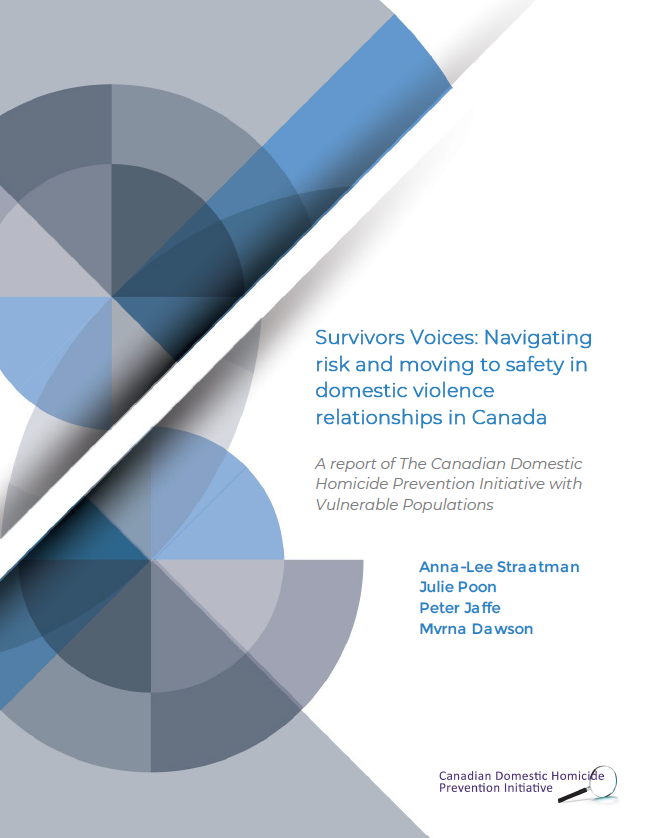 Survivors Voices: Navigating risk and moving to safety in domestic violence relationships in Canada
Survivors Voices: Navigating risk and moving to safety in domestic violence relationships in Canada
This report focuses on research carried out with survivors of domestic violence and loved ones of domestic homicide victims related to risk assessment and safety planning. It provides an overview of key themes that have been identified related to 4 populations: Indigenous, rural, remote & northern; Immigrants & refugees; and children exposed to domestic violence.
This report summarizes research conducted by the Canadian Domestic Homicide Prevention Initiative with Vulnerable Populations with service providers across Canada to gain deeper understanding of potentially unique risk factors, barriers to effective risk assessment, risk management and safety planning, and promising strategies currently being used with these vulnerable groups and the communities in which they live.
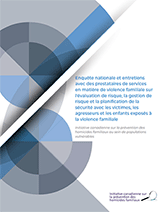 Enquête nationale et entretiens avec des prestataires de services en matière de violence familiale sur l'évaluation de risque, la gestion de risque et la planification de la sécurité avec les victimes, les agresseurs et les enfants exposés à la violence familiale
Enquête nationale et entretiens avec des prestataires de services en matière de violence familiale sur l'évaluation de risque, la gestion de risque et la planification de la sécurité avec les victimes, les agresseurs et les enfants exposés à la violence familiale
Ce rapport résume les recherches menées par L'Initiative canadienne sur la prévention des homicides familiaux au sein de populations vulnérables (ICPHFPV) avec des professionels des différents domaines de la violence familiale, de mieux comprendre les facteurs de risque potentiellement distincts, les obstacles à une évaluation de risque, à une gestion de risque et à une planification de la sécurité efficaces et, enfin, les stratégies prometteuses actuellement utilisées avec ces groupes vulnérables et les communautés dans lesquelles ils vivent.
Advice from Survivors
Two new resources have been developed in partnership with the Learning Network based on research conducted by the CDHPIVP project with survivors of domestic violence.
2. There's a way out: Insights from survivors of intimate partner violence.


The Learning Network in partnership with the Canadian Domestic Homicide Prevention Initiative with Vulnerable Populations (CDHPIVP) is honoured to amplify the voices of survivors and share their advice to family and friends of those who are experiencing Intimate Partner Violence (IPV). Each piece of advice is directly informed by what survivors shared, and quotes from survivors are included here.
We recognize that responses to IPV must be informed by survivors. We appreciate the bravery of survivors in sharing their declarations and continuing to advocate for change.
“It’s like being a prisoner on a desert island and seeing a boat. And the boat comes really, really, really close to you but then it goes… And every time the boat gets really, really close to you, you try to think of a way of sending a signal. But you got to be careful because if you send a signal, he’s there watching you and he knows when you're sending a signal.”
More than 80 survivors across Canada shared their knowledge in interviews conducted as part of the CDHPIVP. CDHPIVP researchers interviewed women who had experienced IPV to learn how they managed the abuse and violence in their relationships, how they sought safety, and what advice they would give to others experiencing violence. The survivors were no longer in an abusive relationship, felt they were safe when they participated in the interview, and were no longer involved in any criminal proceedings.
Women interviewed came from diverse communities and experiences including:
- Living in rural, remote, and northern regions
- Immigrant or refugee status
- Indigenous
The advice shared is broadly applicable to survivors of all gender identities although those interviewed exclusively identified as women. Sharing the voices of women survivors of IPV is important given the high rate at which women, especially marginalized women, face IPV and the barriers they encounter in seeking support. We recognize the necessity of and look forward to efforts to center the voices of survivors of all identities.
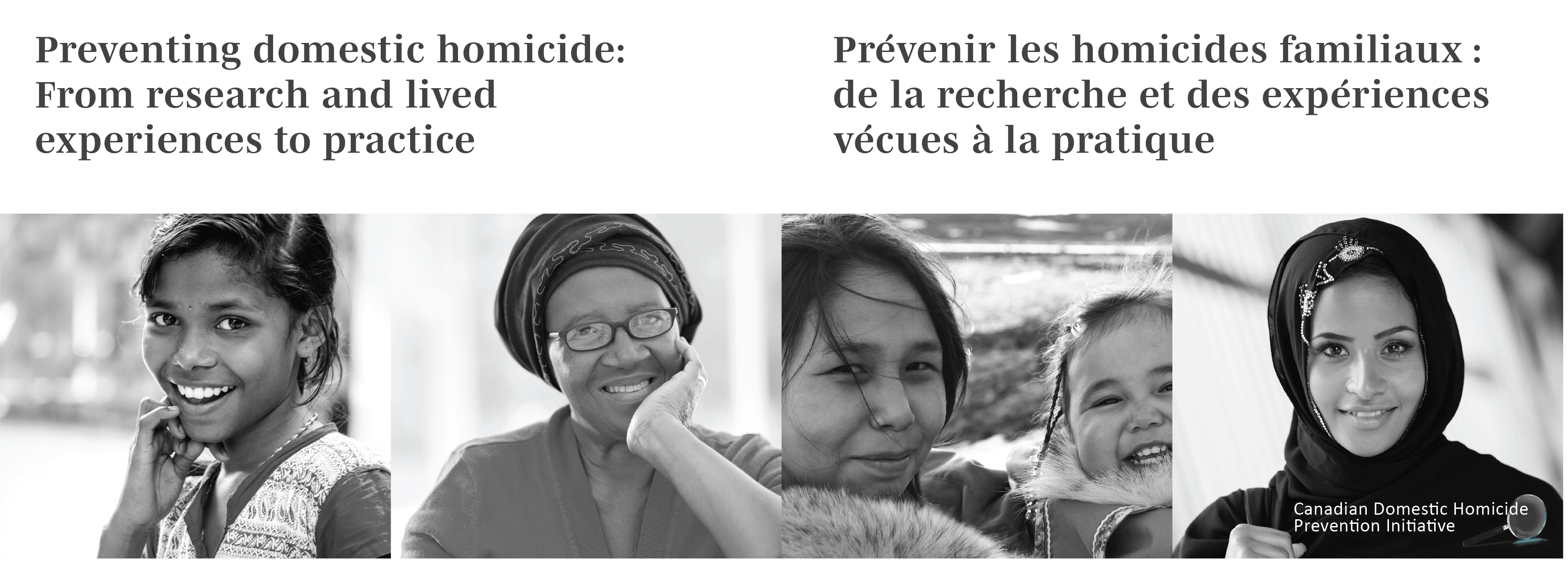
Preventing domestic homicide: From research and lived experiences to practice
This online conference (May 11-14, 2021) focussed on the lessons learned of the Canadian Domestic Homicide Prevention Initiative with Vulnerable Populations — a research project supported by the Social Sciences and Humanities Research Council of Canada. The presentations and recordings are available at 2021 Conference | Canadian Domestic Homicide Prevention Initiative (cdhpi.ca)
Prévenir les homicides familiaux : de la recherche et des expériences vécues à la pratique
Cette conférence en ligne (11-14 mai 2021) s'est concentrée sur les leçons tirées de l'Initiative canadienne de prévention des homicides familiaux auprès des populations vulnérables - un projet de recherche soutenu par le Conseil de recherches en sciences humaines du Canada. Les présentations et les enregistrements sont disponibles à l'adresse suivante http://www.cdhpi.ca/conf-rence-2021
REPORTS
One is too many: 10 Years Of Domestic Homicides In Canada
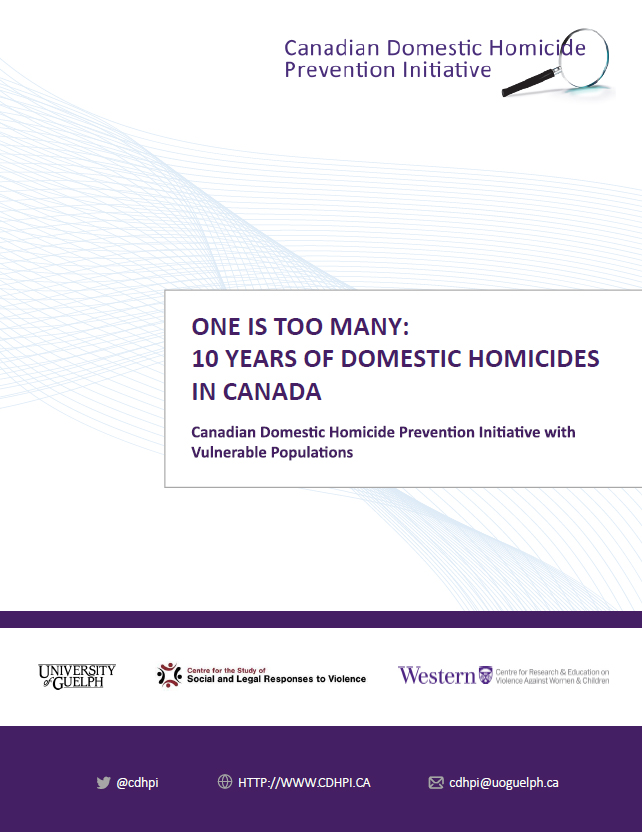
This study documents the number of domestic homicides in Canada between 2010 and 2019 based on court and media reports. This research was conducted as part of a multi-year, SSHRC-funded project entitled The Canadian Domestic Homicide Prevention Initiative with Vulnerable Populations (CDHPIVP; 2015-2021). The project involves academic and community partners across Canada who are focused on promoting collaborative, multi-sectoral research to identify unique individual, community and societal level risk factors that may increase exposure to domestic violence and domestic homicide for specific populations.
One is too many: Trends and Patterns in Domestic Homicides in Canada 2010-2015
This report documents the number of domestic homicides in Canada between 2010 and 2015 based on court and media reports and focuses on four vulnerable populations (Indigenous; rural, remote and northern; immigrant and refugee; children killed in the context of domestic violence) that appear to be at greater risk of domestic homicide due to historical oppression and/or lack of resources because of isolation through factors such as geography, language, culture, age and poverty.
No front page content has been created yet.




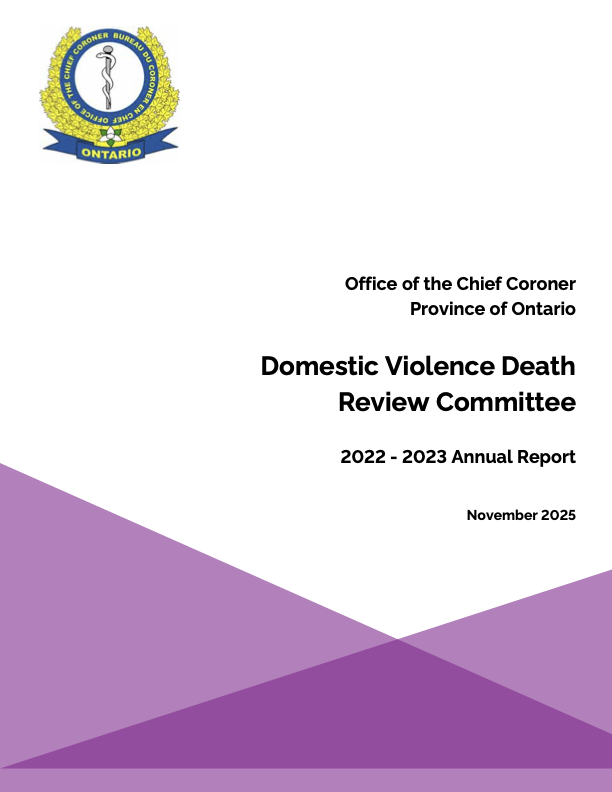
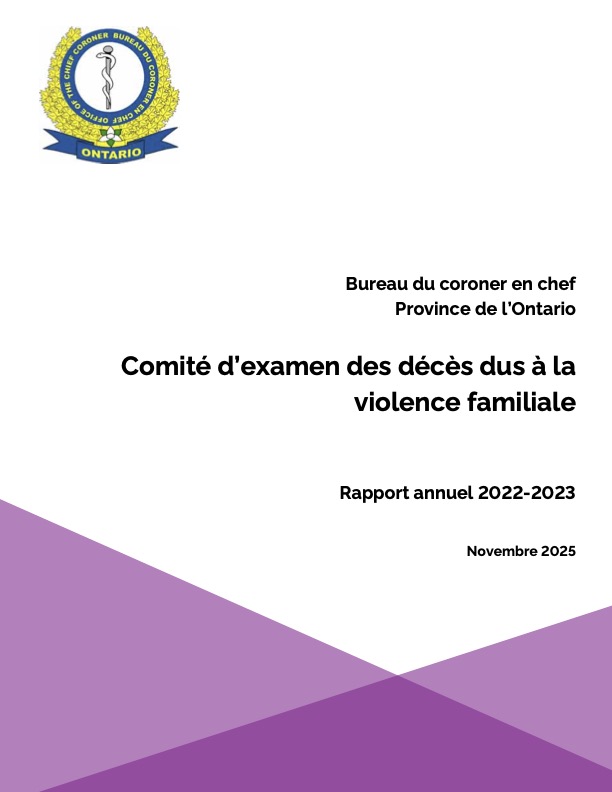
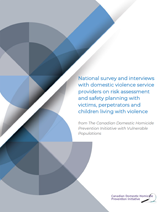 National survey and interviews with domestic violence service providers on risk assessment and safety planning with victims, perpetrators and children living with domestic violence
National survey and interviews with domestic violence service providers on risk assessment and safety planning with victims, perpetrators and children living with domestic violence